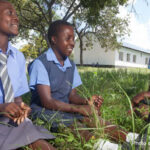Deadline extended to 7 December 2020
Projected publication of this issue of the Journal on Education in Emergencies: July/August 2021
Gender has important implications for educational access, experiences, resources, and achievement (Unterhalter et al. 2014; Parkes et al. 2016). These implications are typically exacerbated in conflict- and crisis-affected environments, given the unique challenges faced by women and girls, men and boys. The INEE Guidance Note on Gender (2019) describes how gender equality in education is often sidelined during humanitarian responses and set aside as an aspirational priority for more stable times. Conflict contributes to gender inequality in education in the long term (Omoeva, Hatch, and Moussa 2016), but even in stable times and areas, gender parity is far from being achieved. Global commitments to support quality, safe, relevant, and equitable education, such as those in the 2030 Sustainable Development Goals (2015) and the Charlevoix Declaration on Quality Education for Girls, Adolescent Girls and Women in Developing Countries (2018) reinforce the need to understand the complex relationship between gendered experiences of conflict and crisis and gender-differentiated education needs and responses in emergencies.
Gender and education are linked in a variety of ways throughout phases and types of conflict and crises. Boys may be coerced into joining fighting forces, while girls are at greater risk of forced marriage, trafficking, early pregnancy, and sexual and gender-based violence. Girls living in crisis-affected countries are half as likely to enroll in secondary school as the global average, and more likely to be out of school than boys (Plan International 2019). For every 10 refugee boys in secondary school there are fewer than seven refugee girls (UNHCR 2017). Concerns for girls’ safety in transit to school or changes in families’ finances may result in keeping girls at home and forcing boys to work. Schools may also be sites of gender-based violence, including homophobic and transphobic aggression (UNESCO 2018). On the other hand, educational attainment is linked to lower rates of early marriage and higher lifetime earning potential (UNHCR 2019). Teaching and learning that acknowledges unique needs of women and girls, men and boys can promote recovery and development after conflict, buttressing programs intended to support child protection, health, nutrition, shelter, and sanitation projects.
The Journal on Education in Emergencies (JEiE) seeks research articles and field notes submission for a special issue on gender and education in emergencies. This issue seeks to draw on and advance existing knowledge on gender and education in emergencies and build novel evidence that accounts for the evolving landscape of these topics. JEiE welcomes theoretical and empirical research articles that analyze, assess, measure, critique, or otherwise address any aspect of gender and education in conflict or crisis contexts.
Additionally, JEiE welcomes field note submissions that present innovative tools or approaches related to gender and education in emergencies, or observations, debates, and commentary on research work. JEiE also invites suggestions for books for review on these themes. Topics of interest include, but are not limited to:
- The relationship between gender and education in conflict and crisis-affected settings
- Gender-responsive curricula, programs, and materials in conflict and crisis settings such as: design, development, staffing, implementation, delivery, and evaluation experiences
- Gender-responsive teacher training and professional development in emergencies
- Observations or reflections on policies, coordination, tools for delivery, and/or programs in support of meeting the Charlevoix Declaration on Quality Education for Girls, Adolescent Girls and Women in Developing Countries and other global education commitments to equal access to quality education
- Intersections between gender inequality and education inequality in emergencies
- Intersections between gendered experiences and other characteristics (i.e., minority group status, ethnicity, religion, disability, social class, etc.) among crisis-affected populations
- Gendered access and representation issues in higher education and the school-to-work transition in conflict and crisis-affected contexts
- LGBTQIA and nonbinary gender experiences and representation among crisis-affected populations
- Sex-disaggregated data collection and use in education in emergencies
- Gendered effects or experiences in education related to COVID-19 or other health emergencies and epidemics
Recognizing the global scope of these issues, JEiE seeks submissions from all regions of the world. However, only manuscripts written in English will be considered for publication at this time.
All manuscripts are subject to a double-blind peer review process and must have a 200-word abstract. Research articles should be 9,000 words or fewer, including references, and field notes submissions should be 4,000 words or fewer, including references. Formatting and references should follow the Chicago Manual of Style, 16th Edition.
The deadline for submitting manuscripts is December 7, 2020. JEiE acknowledges that this is an extraordinary time and that the COVID-19 pandemic has resulted in disrupted daily routines, work, and research projects. Childcare, eldercare, schooling, and other domestic responsibilities disproportionately fall to women. Authors who need extra time or accommodations to submit a manuscript for the special issue should not hesitate to contact the editorial office at journal@inee.org.
If helpful, authors are invited to submit a 200-word abstract by August 31, 2020 for brief comment from the JEiE Editorial Team regarding their manuscript’s suitability for inclusion in the special issue. Submission of an abstract by this date is optional and at the author’s discretion.
More information for authors is available at https://inee.org/evidence/journal/information-for-authors.
More information about the Call for Papers: https://inee.org/evidence/journal/call-for-papers
Please submit manuscripts via PeerTrack, JEiE’s manuscript submission system, at https://www.editorialmanager.com/jeie/default.aspx.





